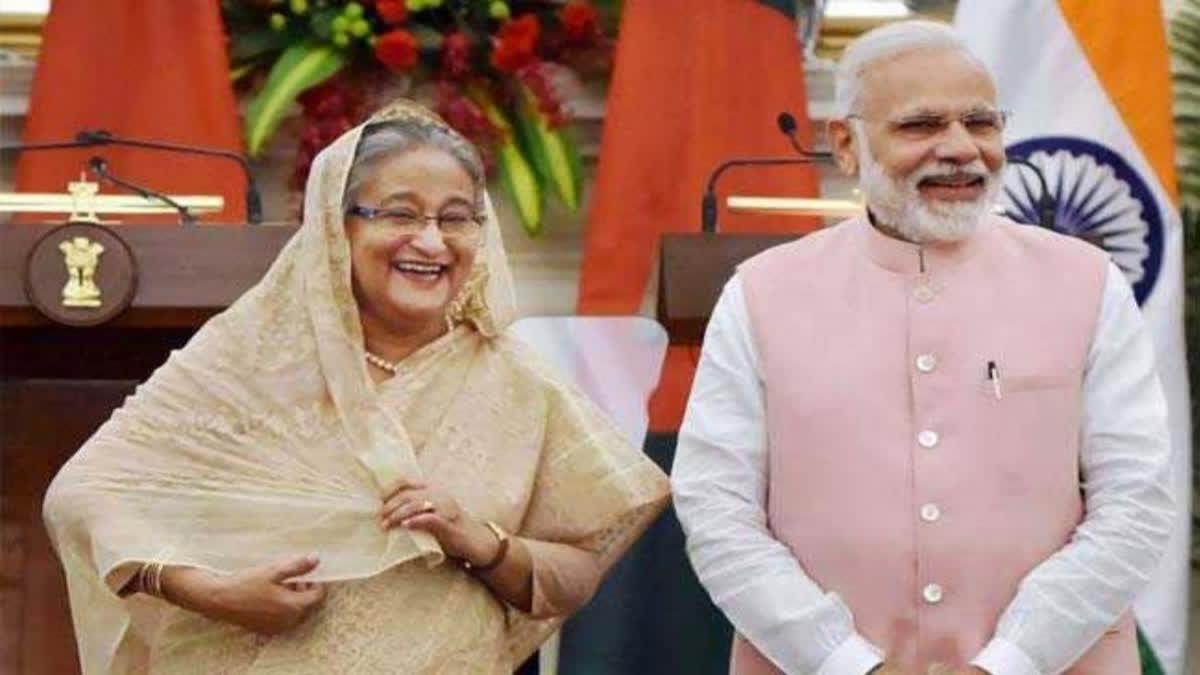New Delhi:The long-pending Teesta waters issue, ties with China, management of the Mongla port and defence sales are expected to come up for discussion when Prime Minister Narendra Modi holds delegation-level talks with his Bangladeshi counterpart Sheikh Hasina here on Saturday.
Hasina will be arriving here on Friday evening in what will be the first incoming bilateral state visit after the formation of the new government in India. She was among the international leaders who had attended the swearing-in ceremony of Modi and the Union Council of Ministers in New Delhi earlier this month.
Teesta waters issue: During the talks on Saturday, the Teesta water sharing issue will among the top priorities. The Teesta River, one of the major transboundary rivers in the region, flows through the Indian states of Sikkim and West Bengal before entering Bangladesh. It plays a crucial role in the agriculture and livelihoods of millions of people in both countries. However, the distribution of its waters has been a contentious issue between India and Bangladesh for decades, causing significant political and diplomatic tension.
The Teesta River’s flow into Bangladesh during the lean season is the main point of contention between India and Bangladesh. Hundreds of thousands of people’s livelihoods are impacted by the river, which drains 2,800 sq km of Bangladesh and flows through the floodplains of Sikkim.
Out of its total length of 414 km, the Teesta River flows for about 151 km through Sikkim, nearly 142 km through West Bengal, and the final 121 km through Bangladesh. The river had an average historical flow of 7932.01 cubic metres per second (cumec) maximum and 283.28 cumec minimum at Dalia, upstream of the Teesta Barrage in Bangladesh.
The issue needs to be settled at the earliest from the Indian side as China is investing heavily in infrastructure in Bangladesh. Bangladesh is likely to receive an almost $1-billion loan from China for a comprehensive management and restoration project on the Teesta River. The management and restoration project is aimed at managing the river basin efficiently, controlling floods and tackling the water crisis in Bangladesh in the summer. However, during his visit to Bangladesh earlier this month, Foreign Secretary Vinay Kwatra stated that India is interested in taking up the project.
India and Bangladesh were close to reaching a deal on theTeesta waters issue during then Prime Minister Manmohan Singh’s visit to Dhaka in 2011. But West Bengal Chief Minister Mamata Banerjee did not accompany Singh and the deal could not be signed at the last moment. Banerjee is opposed to the deal as she is of the view that the water of the Teesta River is decreasing drastically. The river facilitates irrigation of 1.20 lakh hectares of highly arable land in northern West Bengal.
However, in August last year, the Parliamentary Standing Committee on External Affairs recommended that the Teesta water-sharing issue be resolved with Bangladesh, indications are that New Delhi and Dhaka are close to ending this vexed decades-long problem.
“The Committee is aware of the long outstanding issue between India and Bangladesh on sharing of Teesta river water and desires that this important issue be worked out at the earliest for improved bilateral relations with Bangladesh,” the Committee said in its report on India’s Neighbourhood First Policy.
“The Committee also urges the (External Affairs) Ministry to initiate meaningful dialogues with Bangladesh on a regular basis to arrive at a consensus in the matter and the progress and outcome may be informed to the committee on the issue of pending disputes between India and Bangladesh and the fresh initiatives and meaningful dialogues proposed to be taken to resolve such disputes.”
Why this attains significance is that the Committee that made the recommendation had Abhishek Banerjee, general secretary of the TMC and nephew of Mamata Banerjee, as one of its members.
